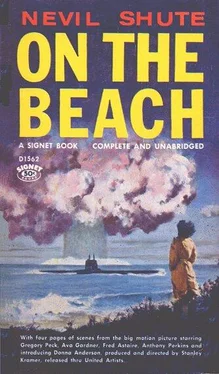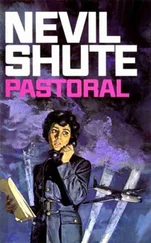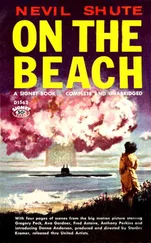As the chequered flag fell for the winner, John Osborne lit a cigarette. "Fun and games," he said. His race was the last of the day.
Peter said thoughtfully, "They’re certainly racing to win..."
"Well, of course," said the scientist. "It’s racing as it ought to be. If you buy it, you’ve got nothing to lose."
"Except to smash up the Ferrari."
John Osborne nodded. "I’d be very sorry to do that." A little rain began to fall on them, wetting the track again. Dwight Towers stood a little way apart with Moira. "Get into the car, honey," he said. "You’ll get wet."
She did not move. "They can’t go on in this rain, can they?" she asked. "Not after all these accidents?"
"I wouldn’t know," he said. "I’d say they might. After all, it’s the same for everybody. They don’t have to go so fast they spin. And if they wait for a dry day this time of year they might wait, well, longer than they’ve got."
"But it’s awful," she objected. "Two people killed in the first race and about seven injured. They can’t go on. It’s like the Roman gladiators, or something."
He stood in silence for a moment m the rain. "Not quite like that," he said at last. "There isn’t any audience. They don’t have to do it." He looked around. "Apart from the drivers and their crews, I don’t suppose there’s five hundred people here. They haven’t taken any money at a gate. They’re doing it because they like to do it, honey."
"I don’t believe they do."
He smiled. "You go up to John Osborne and suggest he scratch his Ferrari and go home." She was silent. "Come on in the car and I’ll pour you a brandy and soda."
"A very little one, Dwight," she said. "If I’m going to watch this, I’ll watch it sober."
The next two heats produced nine crashes, four ambulance cases, but only one death, the driver of the bottom Austin-Healy in a pile up of four cars at The Safety Pin. The rain had eased to a fine, misty drizzle that did nothing to damp the spirits of the competitors. John Osborne had left his friends before the last race, and he was now in the paddock sitting in the Ferrari and warming it up, his pit crew around him. Presently he was satisfied and got out of the car, and stood talking and smoking with some of the other drivers. Don Harrison, the driver of a Jaguar, had a glass of whisky in his hand and a couple of bottles with more glasses on an upturned box beside him; he offered John a drink, but he refused it.
"I’ve got nothing to give away on you muggers," he said, grinning. Although he had what was probably the fastest car on the circuit, he had almost the least experience of any of the drivers. He still raced the Ferrari with the three broad bands of tape across the back that indicated a novice driver; he was still very conscious that he did not know by instinct when he was about to spin. A spin always caught him unawares and came as a surprise. If he had known it, all the drivers were alike on these wet roads; none of them had much experience of driving under such conditions and his consciousness of inexperience was perhaps a better protection than their confidence.
When his crew pushed the Ferrari out on to the grid, he found himself placed on the second line, in front of him the Maserati, the two Jaguars, and the Gipsy-Lotus, beside him the Thunderbird. He settled himself into his seat revving his engines to warm up, fastening his safety belt, making his crash helmet and his goggles comfortable upon his head. In his mind was the thought—This is where I get killed. Better than vomiting to death in a sick misery in less than a month’s time. Better to drive like hell and go out doing what he wanted to. The big steering wheel was a delight to handle, the crack of the Ferrari’s exhaust music to his ears. He turned and grinned at his pit crew in unalloyed pleasure, and then fixed his eyes upon the starter.
When the flag dropped he made a good start and got away well, weaving ahead of the Gipsy-Lotus as he changed up into third and outdistancing the Thunderbird. He went into Lake Bend hard on the heels of the two Jaguars, but driving cautiously on the wet road with seventeen laps to go. Time enough to take chances in the last five laps. He stayed with the Jaguars past Haystack Corner, past The Safety Pin and cautiously put his foot down on the sinuous back straight. Not hard enough, apparently, for with a roar and a crackle the Gipsy-Lotus passed him on the right, showering him with water, Sam Bailey driving like a madman.
He slowed a little, while he wiped his goggles, and followed on behind. The Gipsy-Lotus was wandering all over the road, harnessed only by the immensely quick reaction time of its young driver. John Osborne, watching, sensed disaster round it like an aura; better follow on at a safe distance for a while and see what happened. He shot a quick glance at the mirror; the Thunderbird was fifty yards behind, with the Maserati overtaking it. There was time to take it easy down The Slide, but after that he must step on it.
On entering the straight at the end of the first lap he saw that the Gipsy-Lotus had taken one of the Jaguars. He passed the pits at about a hundred and sixty miles an hour making up upon the second Jaguar; with a car between him and the Gipsy-Lotus he felt safer. A glance in the mirror as he braked before Lake Bend showed that he had drawn well away from the two cars behind; if he could do that, he could hold the fourth position for a lap or two and still go carefully upon the corners.
He did so till the sixth lap. By that time the Gipsy-Lotus was in the lead and the first four cars had lapped one of the Bentleys. As he accelerated away from The Slide he glanced in his mirror and in a momentary glimpse saw what appeared to be a most colossal mix-up at the corner. The Maserati and the Bentley seemed to be tangled broadside on across the road, and the Thunderbird was flying through the air. He could not look again. Ahead of him, in the lead, the Gipsy-Lotus was trying to lap one of the Bugattis by synchronizing its desperate swerves at a hundred and forty miles an hour to the manoeuvre necessary for passing, and failing to do so. The two Jaguars were holding back at a discreet distance.
When he came round again to The Slide he saw that the shambles at the corner had involved two cars only; the Thunderbird lay inverted fifty yards from the track and the Bentley stood with its rear end crushed and a great pool of petrol on the road. The Maserati was apparently still racing. He passed on, and as he entered his eighth lap it began to rain quite heavily. It was time to step on it.
So thought the leaders, for on that lap the Gipsy-Lotus was passed by one of the Jaguars taking advantage of Sam Bailey’s evident nervousness of his unstable car upon a corner. Both leaders now lapped a Bugatti, and a Bentley immediately after. The second Jaguar went to pass them on Haystack Corner with John Osborne close behind. What happened then was very, very swift. The Bugatti spun upon the corner and was hit by the Bentley, which was deflected into the path of the oncoming Jaguar, which rolled over twice and finished right side up by the roadside without a driver. John Osborne had no time to stop and little to avoid; the Ferrari hit the Bugatti a glancing blow at about seventy miles an hour and came to a standstill by the roadside with a buckled near side front wheel.
John Osborne was shaken, but unhurt. Don Harrison the driver of the Jaguar who had offered him a drink before the race, was dying of multiple injuries in the scrub; he had been thrown from his car as it rolled and had then been run over by the Bentley. The scientist hesitated for a moment but there were people about; he tried the Ferrari. The engine started and the car moved forward, but the buckled wheel scraped against the frame. He was out of the race, and out of the Grand Prix, and with a sick heart he waited till the Gipsy-Lotus weaved by and then crossed the track to see if he could help the dying driver.
Читать дальше












